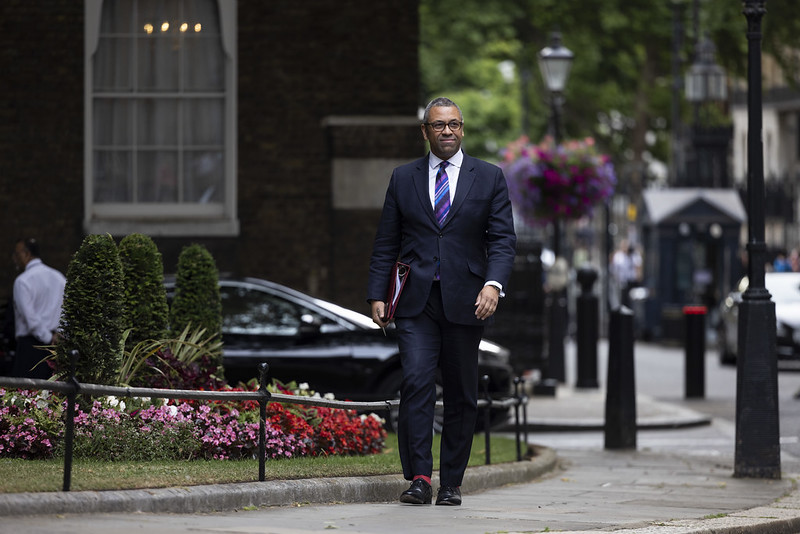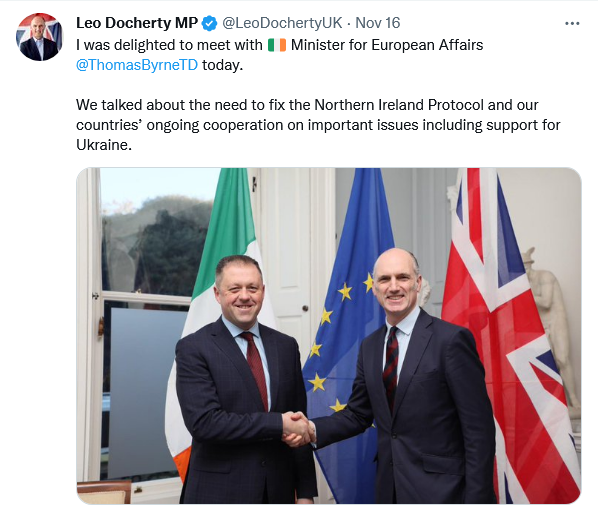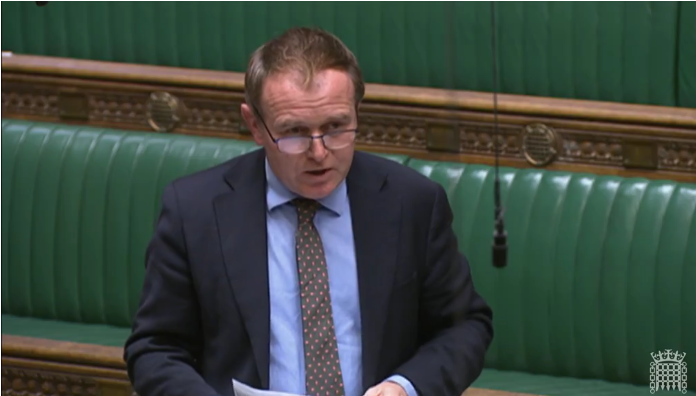Brexit & Beyond Newsletter
21 November 2022
Welcome to the 21 November 2022 Brexit & Beyond newsletter
The UK Foreign Secretary has given evidence on ongoing talks with the EU on the Protocol on Ireland/Northern Ireland. The UK Minister for Europe visited Northern Ireland and Ireland last week. Businesses and medicines suppliers continue to raise concerns about the Protocol, and the Northern Ireland Protocol Bill. The House of Commons debated the UK’s new Free Trade Agreements with Australia and New Zealand.
UK Foreign Secretary on EU-UK relations
On Tuesday 15 November, UK Foreign Secretary James Cleverly appeared before the Commons European Scrutiny Committee to give evidence on the UK’s new relationship with the EU. He told the Committee that the better atmosphere between the EU and UK “should not be read that that means that I am shy in putting forward the very real concerns that exist” regarding the Protocol on Ireland/Northern Ireland. He said that however the Protocol dispute is resolved, it has to address the issues which the Government set out in its command paper.

UK Foreign Secretary James Cleverly | Source: Simon Dawson / No 10 Downing Street
Cleverly stated, “if you are an auditor and you say, ‘Point to me the lines on this spreadsheet where progress has been made’, I would maybe struggle, but…mutual trust and mutual understanding can work wonders. We are heading in the right direction there.” He summarised, “We shouldn’t rush to the conclusion that therefore everything is about to come good, there is still serious work to do and there are still big gaps.” He said he didn’t want to be “defeatist” about the ongoing talks but wanted to manage expectations. He said the EU “now concedes there is a problem that needs to be addressed.”
Regarding the importance of the Protocol and Northern Ireland issue, Cleverly said, “It is on the podium…It is not a peripheral trade issue…it is about the recognition that Northern Ireland is an integral part of the United Kingdom of Great Britain and Northern Ireland, just as much as Braintree is in north Essex.”
Cleverly cited figures on the Protocol, saying that “60% of people who identify themselves as nationalists, 75% of people who identify themselves as Unionists and 60% of people who identify themselves as from neither community believe the protocol should be changed and that there should be no checks on imported goods.” He concluded, “The majority opinion in Northern Ireland agrees with what the UK Government is trying to do.”
The Minister confirmed that the Government “will preserve the Retained EU Law necessary in upholding international obligations [in the Protocol]” but added, “Obviously, what we are looking to do through the changes to the Northern Ireland Protocol is to change those international obligations.” Cleverly said the Government will not fast-track the Northern Ireland Protocol Bill.
The latest on the Protocol and EU-UK relations
UK Parliamentary Under-Secretary of State for Europe Leo Docherty visited Northern Ireland and met with business representatives last week. He said the problems with the Protocol are “really clear to see…we must fix the Protocol…we hope through negotiation we can do that.” He also travelled to Dublin and met the Irish Minister of State for European Affairs, Thomas Byrne. Docherty was the first UK Government Minister appointed by PM Sunak to visit Ireland.

Meeting between UK Parliamentary Under-Secretary of State for Europe, Leo Docherty, and Ireland’s Minister of State for European Affairs, Thomas Byrne | Source: @LeoDochertyUK on Twitter
The Times reports that Prime Minister Rishi Sunak told US President Joe Biden that he will reach a deal with the EU on the Protocol by April, when the leaders met at the G20 summit in Bali. Jill Rutter of the Institute for Government writes that PM Sunak has three “Brexit headaches”: how to land a deal on the Protocol and survive; whether to continue with the Retained EU Law Bill; and how to deal with post-Brexit immigration. She says it’s unclear whether Sunak “has the political strategy or clout within his party to sell any compromise” on the Protocol. A report from the Sunday Times suggesting that the Sunak Government is considering a ‘Swiss-style’ relationship with the EU has been rebuffed.
Businesses highlight Protocol issues
The NI Business Brexit Working Group, a consortium of business organisations, have queried how the UK Government’s Northern Ireland Protocol Bill will work in practice. It has called for a tripartite discussion on the technical issues – involving the EU, UK and businesses, saying “unless it is tripartite, with the three groups simultaneously involved, it risks continuation of the same misunderstandings and contradictions, with varying emphases and interpretations, resulting in further delay and controversy.”
Meanwhile, Teva, the leading supplier by volume of prescription medicines to the NHS, says there are still unresolved issues around medicines supply from GB to NI. The EU changed its rules in April 2022 to ensure continued supply of medicines to NI. Teva said this enabled them to continue supplying medicines to NI without additional complexities. However, one “significant current issue” remains for Centralised Procedure product licences. Teva says, “any situation that leads to the need for two product licences…creates an administrative and cost burden that will make many medicines unviable to supply to NI.” Regarding the Government’s proposed dual regulatory regime in the NI Protocol Bill, Teva says for this to work “there could be no divergence between UK and EU regulations”. The BBC has more on this issue.
This information was submitted to the Lords Sub-Committee on the Protocol, as part of their inquiry into the Northern Ireland Protocol Bill.
Australia and New Zealand trade deals
On Monday 14 November, the UK Parliament debated the Australia and New Zealand trade deals, which the UK signed in in December 2021 and February 2022 respectively. Former Secretary of State for Environment, Food and Rural Affairs George Eustice said he no longer has to “put such a positive gloss on what was agreed” from his position on the back benches. He said the Australia Free Trade Agreement (FTA) is “not actually a very good deal for the UK.” He said, “We did not need to give Australia or New Zealand full liberalisation in beef and sheep—it was not in our economic interest to do so, and neither Australia nor New Zealand had anything to offer in return for such a grand concession.” He suggested the Government should not have set “arbitrary timescales” for concluding negotiations, adding that Liz Truss, then Trade Secretary, “took a decision to set an arbitrary target to conclude heads of terms by the time of the G7 summit, and from that moment the UK was repeatedly on the back foot”. He argued that responsibility for agri-food negotiations should be moved from the Department for International Trade to the Department for Environment, Food and Rural Affairs, “because DEFRA has superior technical knowledge in this area.” Eustice also called for a greater role for Parliament in scrutinising the negotiating mandate for FTAs.

Former Secretary of State for Environment, Food and Rural Affairs George Eustice speaking during the debate | Source: UK Parliament
The Minister for Trade Policy Greg Hands said the deals “will strengthen those links [with Australia and New Zealand], supporting increased volumes of trade, jobs and wages and bringing more choice for the UK consumer.”
A report from the Lords International Agreements Committee on the New Zealand FTA, published earlier this month, said the economic benefits of the deal are “likely to be positive but limited”. It states, “It remains to be seen how UK agriculture will be impacted by the agreement…and whether the safeguards will protect the interests of the UK agricultural sector.” The committee notes, “The devolved nations are likely to be particularly affected due to the importance of agriculture in Scotland, Wales and Northern Ireland.” It calls on the Government to ensure that consultation with the devolved administrations and legislatures is “transparent, detailed and timely, and that their views are represented throughout the negotiations”.
Previously, the Northern Ireland Department for the Economy submitted evidence on the Australia FTA, stating it “does not deliver on UK interests as sensitive agriculture sectors are not given sufficient protection from imports…our biggest concerns arising from the FTA is the impact on the beef and sheep sectors.” A report from the Lords Committee, published in June, on the Australia FTA says the UK Government has an “obligation to ensure that Northern Ireland is able to benefit from any new trade agreements and is not disadvantaged compared to the rest of the UK”. The Department for International Trade confirmed that Protocol obligations would supersede a Free Trade Agreement, if there is a conflict.
Other news
- The Government has responded to the Commons European Scrutiny Committee report on Retained EU Law (REUL). The Government states, “Whilst a formal mechanism to inform Parliament of where changes to REUL could impact on divergence with Northern Ireland is not included in this Bill, the Government will of course work to ensure that Parliament is kept informed of any divergence related issues.” The Retained EU Law Bill is currently at committee stage in the Commons, with the next sittings scheduled for 22 and 24 November.
- The Government has announced that it will give businesses an additional two years to apply new post-Brexit product safety markings. It will continue to recognise the CE marking (for products traded in the European Economic Area) until the end of 2024, as well as the UK Conformity Assessed (UKCA) marking it introduced in January 2021. Under the Protocol, the CE marking will continue to be recognised for goods sold in Northern Ireland; goods will need to use the UKNI marking if they use a UK Conformity Assessment Body to test their products. The Financial Times reports that this postponement is in response to pressure from industry who see the UKCA mark as “adding costs and extra bureaucracy”.
- ‘Negotiating the Future’, the Centre for Competition Policy at the University of East Anglia, and Brexit & Environment have published a new report on UK regulation after Brexit.
- The EU Council and European Parliament have held the first inter-institutional negotiation on EU measures to protect its single market, if the UK breaches the Withdrawal Agreement.
- The Lords Common Frameworks Scrutiny Committee has published a response from the Office for the Internal Market to its report. The Committee recommended that the Office for the Internal Market “make clear in its statutory reports exactly how in practice it takes into account devolved policy autonomy when advising on, and assessing, the impact of policy divergence agreed through common frameworks on the UK internal market.”
- EU member states were briefed on the state of play of UK-EU relations at the General Affairs Council on 18 November.




